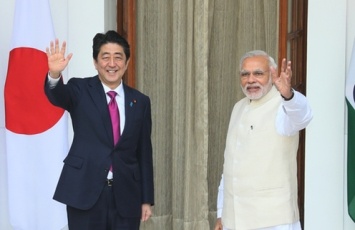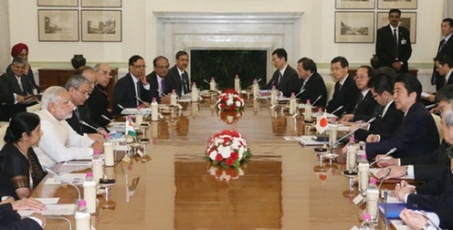Japan-India Relations
Japan-India Summit Meeting
December 13, 2015
 Photo: Cabinet Public Relations Office
Photo: Cabinet Public Relations Office
 Photo: Cabinet Public Relations Office
Photo: Cabinet Public Relations Office
 Photo: Cabinet Public Relations Office
Photo: Cabinet Public Relations Office
Mr. Shinzo Abe, Prime Minister of Japan, held a Japan-India Summit Meeting in New Delhi with H.E. Mr. Narendra Modi, Prime Minister of the Republic of India on Saturday, December 12, from around 11:00 a.m. to around 12:00 p.m. The overview of the meeting is as follows. After the meeting, the two leaders signed the ''Japan and India Vision 2025 Special Strategic and Global Partnership: Working Together for Peace and Prosperity of the Indo-Pacific Region and the World, (Fact sheet (PDF) ) '' a joint statement that will serve as a guidepost for the ''new era in Japan-India relations.''
) '' a joint statement that will serve as a guidepost for the ''new era in Japan-India relations.''
 ) '' a joint statement that will serve as a guidepost for the ''new era in Japan-India relations.''
) '' a joint statement that will serve as a guidepost for the ''new era in Japan-India relations.''1 Opening remarks
Prime Minister Modi welcomed Prime Minister Abe to India, and expressed the view that the Japan-India relationship has moved to the higher level, and stated that strong India and strong Japan would be mutually important, and the amicable relationship between the two countries would have a major influence on all of Asia.
Prime Minister Abe replied that the Japan-India relationship is ''blessed with the largest potential for development of any bilateral relationship anywhere in the world,'' and that he intends to cooperate with Prime Minister Modi in order to transform the Japan-India relationship from a bud with potential into a flower in full bloom, thus ushering in the beginning of a new era in Japan-India relations. Prime Minister Abe expressed that strong India is good for Japan and strong Japan is good for India, and through the solid Japan-India relationship, Japan hopes to drive the peace and prosperity of the Indo-Pacific region as well as the international community.
Prime Minister Abe replied that the Japan-India relationship is ''blessed with the largest potential for development of any bilateral relationship anywhere in the world,'' and that he intends to cooperate with Prime Minister Modi in order to transform the Japan-India relationship from a bud with potential into a flower in full bloom, thus ushering in the beginning of a new era in Japan-India relations. Prime Minister Abe expressed that strong India is good for Japan and strong Japan is good for India, and through the solid Japan-India relationship, Japan hopes to drive the peace and prosperity of the Indo-Pacific region as well as the international community.
2 Politics and security
(1) Legislation for Peace and Security
Prime Minister Abe explained that Japan's recently enacted Legislation for Peace and Security is an actual practice of the ''Proactive Contribution to Peace'' and requested support for the legislation. Prime Minister Modi respected Prime Minister Abe's leadership on the enactment of the Legislation for Peace and Security and, at the same time, expressed India's support for the legislation.(2) Security cooperation
Prime Minister Modi explained that maritime security is becoming a major challenge and he hopes Japan and India will reinforce maritime surveillance capacity and further promote information-sharing. With regard to the South China Sea, Prime Minister Modi explained that India is also concerned with the situation and major common agenda for India and Japan, as demonstrated by the strong messages at the G20 and ASEAN meetings, and he expected that the issue is peacefully resolved based on international law. Prime Minister Modi expressed his intention to continue inviting Japan to participate in the India-US joint naval exercise ''Malabar.''Prime Minister Abe welcomed the signing of the Agreement concerning the Transfer of the Defense Equipment and Technology (PDF)
 and the Agreement concerning Security Measures for the Protection of Classified Military Information (PDF)
and the Agreement concerning Security Measures for the Protection of Classified Military Information (PDF) . Prime Minister Abe stated that Japan's regular participation in the Exercise ''Malabar'' is meaningful and he intends to strengthen cooperation with the ''JAI'' countries. (Note: The Japan, America and India acronym of ''JAI'' means victory in Hindi. This was proposed by Prime Minister Modi at a previous summit meeting). In response, Prime Minister Modi expressed his hope that Japan, India and the United States will move ahead with regional connectivity and humanitarian aid and disaster relief (HA/DR), as a part of ''JAI'' cooperation.
. Prime Minister Abe stated that Japan's regular participation in the Exercise ''Malabar'' is meaningful and he intends to strengthen cooperation with the ''JAI'' countries. (Note: The Japan, America and India acronym of ''JAI'' means victory in Hindi. This was proposed by Prime Minister Modi at a previous summit meeting). In response, Prime Minister Modi expressed his hope that Japan, India and the United States will move ahead with regional connectivity and humanitarian aid and disaster relief (HA/DR), as a part of ''JAI'' cooperation.
(3) Nuclear energy cooperation
Prime Minister Modi stated that he is pleased that agreement has been reached on the Agreement for Cooperation in the Peaceful Uses of Nuclear Energy, and that it will also be a major business opportunity for Japanese companies. Prime Minister Abe replied that Japan appreciates that India is maintaining its commitment to a unilateral and voluntary moratorium on nuclear testing, and that he hopes to deepen cooperation in the field of disarmament and non-proliferation as nuclear energy cooperation between the two countries may advance in the future. Prime Minister Abe stated that Japan is proactively engaging in realizing ''a world without nuclear weapons'' and this goal is already shared with India. Prime Minister Abe explained that Japan attaches importance to the universalization of Treaty on the Non-Proliferation of Nuclear Weapons (NPT), the prompt entry into force of the Comprehensive Nuclear-Test-Ban Treaty (CTBT), and the prompt commencement of negotiations on the Fissile Material Cutoff Treaty (FMCT), and Japan also intends to continue dialogue on these issues.3 Economy and economic cooperation
(1) High-Speed Railway
Prime Minister Modi stated that High-Speed Railway is an extremely major topic for India also in term of politics, and India has made a decision on introducing High-Speed Railway to the country, and this will in itself be a catalyst which has a major impact on the entire Indian economy. Prime Minister Modi expected its contribution to ''Make in India.''Prime Minister Abe expressed his gratitude for India's decision to introduce the Shinkansen system, explained that the Shinkansen system is in a highest class of High-Speed Railway systems worldwide in terms of its safety and accuracy, and expressed his strong expectation that this Shinkansen system will be introduced into India's other High-Speed Rail corridors as well.
(2) Business environment
Prime Minister Abe expressed his support for the reform initiatives that Prime Minister Modi is forwarding, and he noted Japan establish a 1.5 trillion yen financing facility for Japanese companies setting up businesses in India by Nippon Export and Investment Insurance (NEXI) and Japan Bank for International Cooperation (JBIC) for the purpose of expanding business opportunities for Japanese companies. Prime Minister Abe explained that approximately 400 billion yen of Official Development Assistance (ODA) is expected in this fiscal year and Japan is contributing to the development of quality infrastructure, and he requested that the Indian Government executes proper and predictable tax enforcement, as well as preparing a special policy package including the development of infrastructure in the vicinity of Japanese industrial complexes. Prime Minister Abe expressed his intention to cooperate on supporting strategic connectivity linking South Asia to Southeast Asia through the synergy between ''Act East'' policy and ''Partnership for Quality Infrastructure.''Prime Minister Modi expressed his gratitude for Japan's support for India's reform and his intention to consider what can be done regarding the proposal for promoting business opportunities. Prime Minister Modi stated that India needs quality infrastructure based on his past experience as Chief Minister of Gujarat, and he expressed his expectation of high-level technology transfer from Japan, noting that this will be a major incentive for the Japanese and Indian business communities as well.

